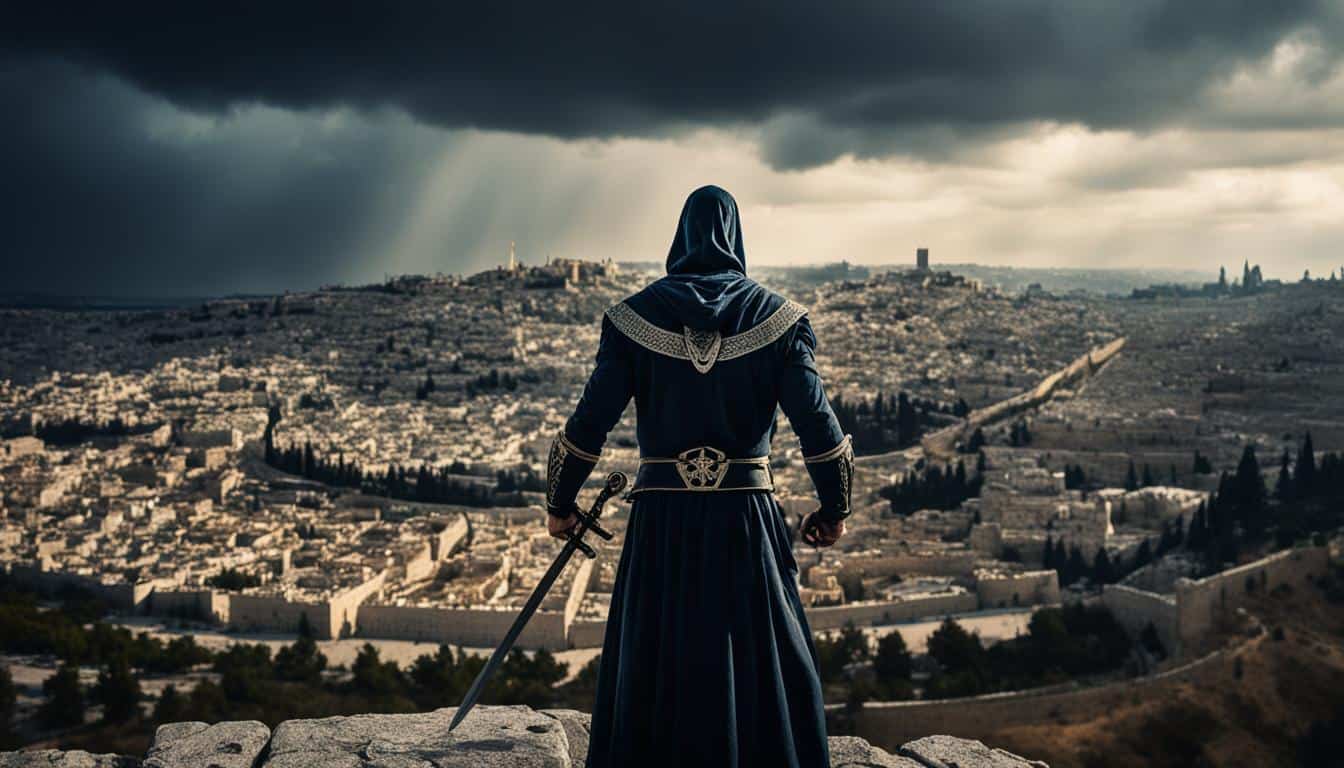Table of Contents
Ever thought about what it means for Zion to embrace justice and righteousness?
How do Jerusalem’s prophets align with Jesus’ lessons?
In this piece, we dive into Zion’s Justice in the scriptures. Let’s explore prophecies from Isaiah, Jeremiah, Daniel, and others. We’ll see how Zion’s Justice comes to life through Christ.
The Bible often speaks of Zion as a hub of justice and righteousness.
But what’s the real meaning behind this?
How do these ideas of a just Zion tie with Jesus’ teachings and the Kingdom of God?
Isaiah 2:2-4 gives us a glimpse of Zion as the heart of justice. Here, weapons become tools for farming. This picture links closely with Jesus’ teachings on the Kingdom of God. He stressed justice and righteousness for his followers.
Isaiah’s Prophecy of a Just and Righteous Zion
Isaiah 2:2-4 shares an inspiring vision from Prophet Isaiah about a future where Zion stands above all, drawing nations to it. In this future, Justice and righteousness fill Zion, echoing Jesus’ teachings on God’s Kingdom.
Isaiah tells of a time when everyone will seek the Lord and follow His ways. This change brings about a society filled with justice and goodness. It mirrors Jesus’ message to His followers about pursuing righteousness and obeying God.
“And many people shall go and say, Come ye, and let us go up to the mountain of the Lord, to the house of the God of Jacob; and he will teach us of his ways, and we will walk in his paths: for out of Zion shall go forth the law, and the word of the Lord from Jerusalem” (Isaiah 2:3).
Isaiah’s vision expands further, showing Zion as God’s dwelling place, at the heart of His Kingdom. This reflects Jesus’ words about living under God’s rule and promoting His justice on earth.
Jesus’ life, death, and teachings make Isaiah’s vision possible. Through Jesus, we find redemption and the strength to live righteously. By following His ways, we help bring about Zion’s Justice and God’s Kingdom.
Exploring Isaiah’s prophecy helps us understand justice and righteousness in God’s Kingdom. Isaiah’s vision offers us a base to learn how we can achieve Zion’s Justice in our lives and local communities.
The Branch from Jesse and Jesus’ Just Leadership
The book of Isaiah shares a deep prophecy. It talks about a branch growing from Jesse’s stump – Jesse was King David’s father. This prophecy is in Isaiah 11:1-5. It shows us the link between Jesus’ fair leadership and Zion’s Justice concept. Let’s explore how this prophecy and Jesus’ teachings are connected.
Isaiah 11:1-5 states:
1 And there shall come forth a rod out of the stem of Jesse, and a Branch shall grow out of his roots:
2 And the spirit of the Lord shall rest upon him, the spirit of wisdom and understanding, the spirit of counsel and might, the spirit of knowledge and of the fear of the Lord;
3 And shall make him of quick understanding in the fear of the Lord: and he shall not judge after the sight of his eyes, neither reprove after the hearing of his ears:
4 But with righteousness shall he judge the poor, and reprove with equity for the meek of the earth: and he shall smite the earth with the rod of his mouth, and with the breath of his lips shall he slay the wicked.
5 And righteousness shall be the girdle of his loins, and faithfulness the girdle of his reins.
These verses describe a leader filled with wisdom, understanding, and justice. Jesus came from Jesse’s line, becoming the Branch Isaiah talked about. He meets all expectations of Isaiah’s prophecy.
Throughout his life, Jesus stood firmly for justice. He broke social rules, fought against oppression, and showed kindness and fairness to all. He taught the importance of treating everyone with respect, especially the less fortunate.
Revelation also shows Jesus’ fair rule, saying he will judge rightly just like Isaiah predicted.
Revelation 19:11-16 states:
11 And I saw heaven opened, and behold a white horse; and he that sat upon him was called Faithful and True, and in righteousness he doth judge and make war.
12 His eyes were as a flame of fire, and on his head were many crowns; and he had a name written, that no man knew, but he himself.
13 And he was clothed with a vesture dipped in blood: and his name is called The Word of God.
14 And the armies which were in heaven followed him upon white horses, clothed in fine linen, white and clean.
15 And out of his mouth goeth a sharp sword, that with it he should smite the nations: and he shall rule them with a rod of iron: and he treadeth the winepress of the fierceness and wrath of Almighty God.
16 And he hath on his vesture and on his thigh a name written, King Of Kings, And Lord Of Lords.
As Jesus’ followers, we should follow his lead. We need to show righteousness, fairness, and kindness. This way, we help bring Zion’s Justice into our communities. We can make Isaiah’s vision in 11:1-5 come true.

Micah’s Vision of Peace in Jerusalem and Jesus as the Prince of Peace
The book of Micah shares a vision of Zion as a peace-filled place. Micah 4:1-3 talks about a time when nations will unite to learn from the Lord. No more wars or fights will happen.
This dream shows Micah’s hope for a society that is just and peaceful. It’s where everyone gets along and does what’s right.
Jesus is key to making this vision real. Ephesians 2 tells us Jesus ended division and brought everyone together with God. He is the main figure bringing peace and unity.
Jesus’ words support Micah’s dream by urging peace, love, and forgiveness. He showed us how to face aggression, love those who are against us, and fix broken bonds. His life, death, and resurrection give us a chance to live peacefully with others.
“Blessed are the peacemakers, for they shall be called sons of God.” – Jesus (Matthew 5:9)
Thinking about Micah’s vision and Jesus as the Prince of Peace, we’re inspired to follow this path. We should strive for peace, justice, and fixing what’s broken. It’s our mission to spread love and kindness in our troubled world.
Jeremiah’s New Covenant and the Establishment of Justice through Christ
Jeremiah was a prophet who looked forward to a future filled with justice and righteousness. This vision was based on a new covenant, mentioned in Jeremiah 31:31-34. He described a time when people would undergo an inner change and truly know God.
This covenant wasn’t about outward acts or rituals. It was about changing people’s hearts. This deep transformation would lead to real justice and righteousness.
“But this is the covenant that I will make with the house of Israel after those days, says the Lord: I will put my law within them, and I will write it on their hearts; and I will be their God, and they shall be my people.”
Jesus Christ made Jeremiah’s prophecy come true. In Luke’s Gospel, Jesus talks about the new covenant during the Lord’s Supper. He says, “This cup is the new covenant in my blood, which is poured out for you” (Luke 22:20).
Jesus’ death and resurrection established this new covenant. He brought justice and righteousness in a new way. Through Jesus, we receive forgiveness, salvation, and the Holy Spirit’s guidance.
Jesus lived as Jeremiah’s words predicted. His life of love, compassion, and giving shows what true justice and righteousness are.
When we accept Jesus, we enter this new covenant. This lets us experience God’s transforming grace. The Holy Spirit helps us live justly and righteously.
Benefits of Jeremiah’s New Covenant
The new covenant offers great benefits for those who embrace it:
- Forgiveness: It gives us freedom from sins and reconnects us with God. We’re released from guilt and shame and can enjoy the happiness of God’s grace.
- Transformation: This covenant changes us from the inside. God’s laws guide our hearts, helping us follow His righteous ways.
- Intimate Relationship with God: We get to know God closely. He leads us, offers guidance, and cares for us as His own.
- Justice and Righteousness: With Christ, we’re called to live by justice and righteousness. We stand up for the disadvantaged and live in a way that pleases God.
- Eternal Life: We’re promised eternal life with God. Our faith in Christ ensures we’re with God forever.
The new covenant showcases God’s love and commitment to justice. It calls us to live by God’s love, showing justice and righteousness in our lives.
Table: Key Aspects of Jeremiah’s New Covenant
| Aspect | Description |
|---|---|
| Inward Transformation | The new covenant brings about a transformation from within, as God writes His laws on our hearts. |
| Forgiveness of Sins | Through the new covenant, we receive forgiveness of sins and reconciliation with God. |
| Intimate Relationship with God | We enter into a deep and personal relationship with God, where He becomes our God and we become His people. |
| Justice and Righteousness | The new covenant calls us to embody justice and righteousness, seeking justice for the oppressed and living righteously before God. |
| Eternal Life | The new covenant offers the assurance of eternal life with God, reconciled to Him for all eternity. |
Zechariah’s Prophetic Image and Jesus’ Entry into Jerusalem
Zechariah was an Old Testament prophet who depicted a humble king coming to Jerusalem. This foreshadowed Jesus entering Jerusalem in His last week on Earth. It showed a link between prophecy and Jesus’ journey.
In Zechariah 9:9, we find the words:
“Rejoice greatly, O daughter of Zion; shout, O daughter of Jerusalem: behold, thy King cometh unto thee: he is just, and having salvation; lowly, and riding upon an ass, and upon a colt the foal of an ass.”
This prophecy matches Jesus’ entry into Jerusalem, as told in Matthew 21:5:
“Tell ye the daughter of Sion, Behold, thy King cometh unto thee, meek, and sitting upon an ass, and a colt the foal of an ass.”
Jesus chose to enter Jerusalem on a donkey, showing humility and fulfilling Zechariah’s words. He demonstrated His mission was to bring righteousness and salvation. It was a powerful moment in His ministry.
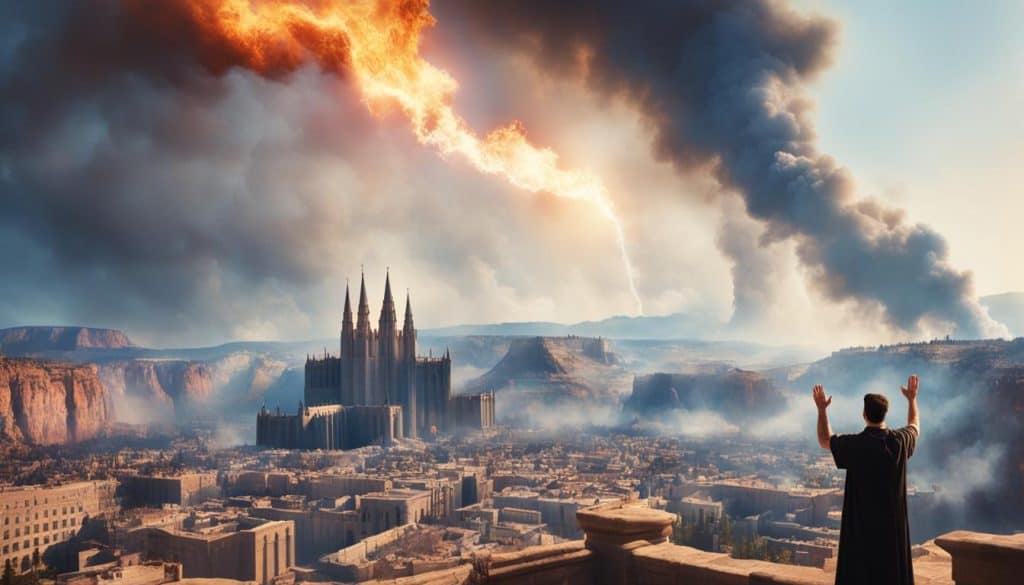
The prophecy highlights a king of peace, not war. It was about a king who leads with gentleness. Jesus entering Jerusalem was a key part of His mission, moving towards His sacrifice.
Zechariah’s vision shows us God’s plan. It tells us true leaders are humble and serve others. It’s a lesson in kindness and doing right.
Jesus’ Mission and the Fulfillment of Zion’s Justice
Jesus coming to Jerusalem was a critical time. It began the last chapter of His work on Earth. It was about showing God’s love and fairness to all.
Jesus lived as Zechariah predicted. He was just, kind, and humble. He taught love and stood up for those left out. His life changed many views and helped the ignored.
By living out the prophecy, Jesus showed what Zion’s Justice means. His lessons and death aimed for a fair world. A world where everyone is important and can thrive.
We, as Jesus’ followers, need to live by these values too. We should help those in need, fight unfairness, and make a better society. It’s about reflecting Jesus’ ideals in our actions.
The prophecy about Jesus connects His work to God’s bigger plan. It confirms His role and the power of God’s words through time. It’s a lasting message for us all.
Psalms and the Connection to Divine Justice Fulfilled in Christ
The Psalms are full of deep wisdom. They show us the link between Zion’s Justice and God’s justice, seen in Christ. They express a strong desire for fairness and kindness in Zion’s context.
Zion, the holy city, represents God’s presence and how justice is built there. Psalm 9:11-12 goes, “Sing praises to the Lord, which dwelleth in Zion: declare among the people his doings. When he maketh inquisition for blood, he remembereth them: he forgetteth not the cry of the humble.” This shows how God’s fairness comes from Zion, listening to those who are down and humble.
This fairness reaches its peak in Christ. His life, death, and return to life offer hope and fixing to believers. Hebrews 1:8 connects Him with divine justice, saying, “But unto the Son he saith, Thy throne, O God, is for ever and ever: a sceptre of righteousness is the sceptre of thy kingdom.” This means Christ’s rule is fair and just, showcasing His power in God’s kingdom.
“For God is the King of all the earth: sing ye praises with understanding.”
Psalms urge us to praise God wisely. They teach us about God’s fairness and His plans for Zion.
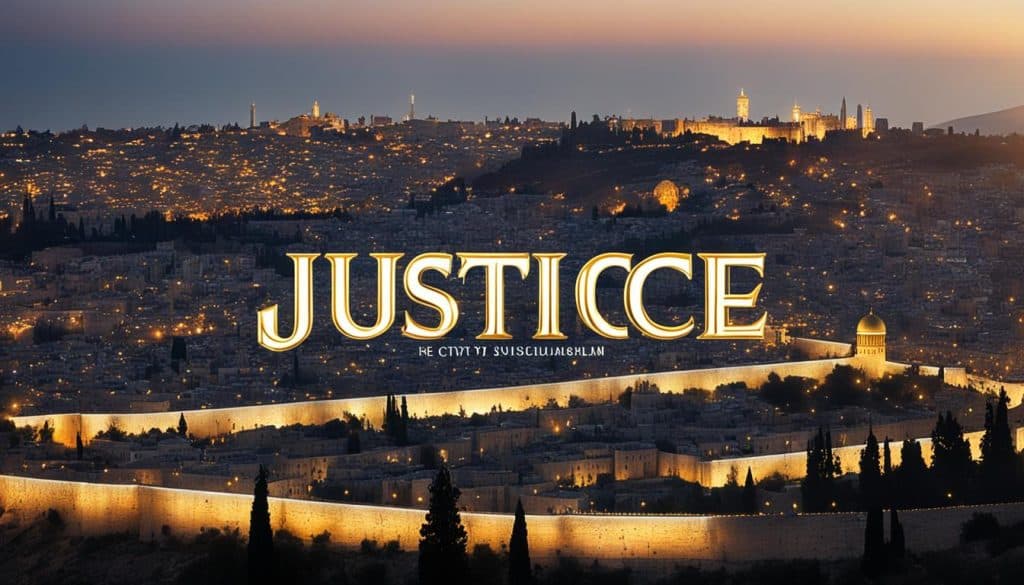
The Psalms are like a rich puzzle of prayers and songs. They reveal how Zion ties to divine justice. This justice is completed in Christ, calling on believers to bring fairness into their lives. This mirrors the just rule of God’s kingdom.
| Psalms | Zion’s Connection | Divine Justice Fulfilled in Christ |
|---|---|---|
| Psalms 9:11-12 | The divine justice emanating from Zion | Christ’s remembrance of the oppressed |
| Hebrews 1:8 | Zion as the kingdom of righteousness | Christ’s righteous rule in the kingdom of God |
Ezekiel’s Symbolic Prophecy and Christ’s Presence Among His People
Ezekiel’s vision in Ezekiel 47:1-12 shows a new temple, symbolizing Christ with His people. It gives deep insights into Zion’s Justice, fulfilled by Jesus.
In his vision, Ezekiel sees a river from the temple getting wider and deeper. It symbolizes the life and blessings from Christ. The river shows the Holy Spirit’s work and the change when Christ is with us.
“Then he brought me back unto the door of the house; and, behold, waters issued out from under the threshold of the house eastward: for the forefront of the house stood toward the east, and the waters came down from under from the right side of the house, at the south side of the altar.”
This vision shows Christ’s transformative power in our lives. Like the river brings vitality, Christ brings renewal. He embodies Zion’s Justice.
The river’s depth growing shows Christ’s growing impact. As His presence grows, it brings freedom and healing. This is like Jesus’ words in John, where He talks about being the living water:
“Jesus stood and cried, saying, If any man thirst, let him come unto me, and drink. He that believeth on me, as the scripture hath said, out of his belly shall flow rivers of living water.”
The river in Ezekiel symbolizes Christ’s grace and love. It shows His power to change lives. Believers can live out Zion’s Justice because of Him.
Ezekiel’s prophecy foreshadows Christ’s impact. By following His teachings and love, we show Zion’s Justice to the world.
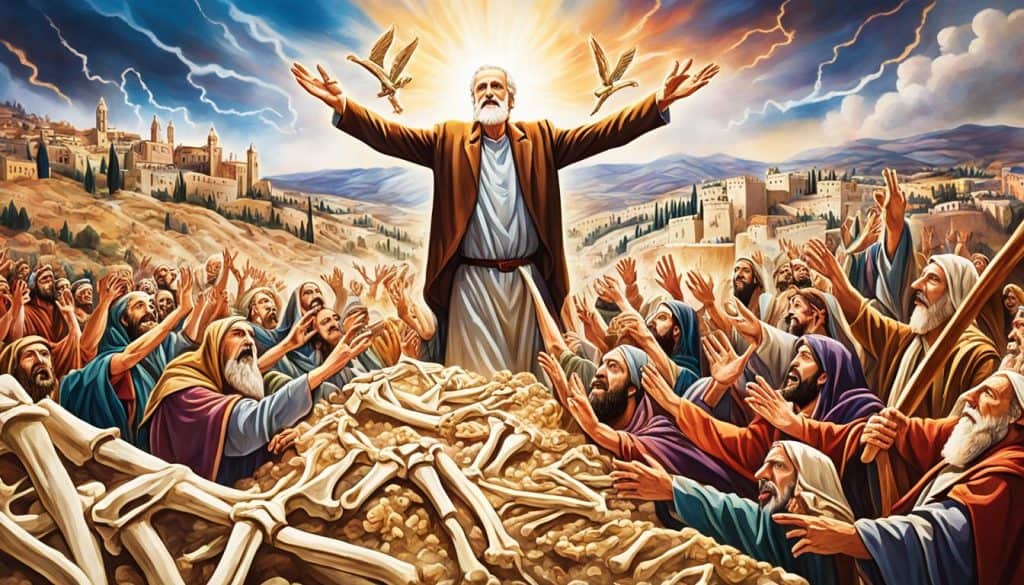
| Ezekiel’s Prophecy | Christ’s Presence | |
|---|---|---|
| Symbolism | Depicts a new temple and a flowing river | Reflects the transformative power of Christ’s presence |
| Implications | Symbolizes the fulfillment of Zion’s Justice | Brings abundant life, renewal, and restoration |
| Teachings | Highlights the progressive and transformative nature of Christ’s work | Emphasizes the role of Christ as the source of living water |
| Application | Inspires believers to embrace and extend the principles of Zion’s Justice | Encourages believers to become vessels for Christ’s love and grace |
Joel’s Prophecy and the Foreshadowing of Christ’s Work
In Joel’s book, a prophecy hints at Christ’s work and Spirit in Jerusalem. Joel 2:28-32 talks about Zion’s Justice and Jesus fulfilling God’s plan.
Joel predicts a time when God’s Spirit covers everyone. It says, “I will pour out my Spirit on all flesh; your sons and daughters will prophesy. Your old men will dream, and your young men will see visions” (Joel 2:28). This shows Christ’s transformation in believer’s lives.
Acts 2:16 in the New Testament points to Joel’s prophecy at Pentecost. Peter tells the crowd, “This was spoken by the prophet Joel: ‘I will pour out my Spirit on all flesh'” (Acts 2:16).
The Pouring of the Spirit and the Work of Christ
Joel’s prophecy about the Spirit marks the start of Christ’s mission. It shows the Holy Spirit living in believers, helping them live right and just lives. Christ’s work gives us the Spirit, so we can show God’s Kingdom and work for justice.
The Spirit comes to all, not just some. Joel says both young and old, men and women, will get the Spirit. This shows God’s wish for everyone to feel His presence and change through His power.
We must welcome the Spirit’s role in our life. The Holy Spirit lets us follow Jesus’ path. With the Spirit, we can spread His love and work for justice and righteousness on earth.

The picture above shows the Spirit’s effect, changing believers’ lives through Christ.
“I will pour out my Spirit on all flesh; your sons and your daughters shall prophesy, your old men shall dream dreams, and your young men shall see visions.” – Joel 2:28
This Joel verse underlines the Spirit’s broad reach and effect on all ages and backgrounds. It highlights the aim of Zion’s Justice and believers spreading God’s kingdom message.
Daniel’s Vision of Judgment and Kingdom Given to the “Son of Man”
The book of Daniel shares a vision. It talks about judgment and a kingdom for the “Son of Man.” This vision is crucial. It shows Zion’s Justice and how Jesus Christ fulfills it.
In Daniel 7:13-14, we see a unique scene. A “Son of Man” stands before the Ancient of Days. He gets dominion, glory, and an everlasting kingdom. This vision is about power, goodness, and defeating evil.
Turning to Jesus’ teachings, we notice a strong link to Daniel’s vision. In Matthew 26:6, Jesus calls himself the “Son of Man.” This connects him directly to the vision. Jesus becomes the key to Daniel’s prophecy and the future kingdom.
The vision ties to Zion’s Justice. It’s about setting up a fair and just kingdom. Jesus achieves this through his actions on earth. His life, death, and resurrection start a new time of justice and goodness.
Jesus fulfills Daniel’s vision and the kingdom given to the “Son of Man.” He creates a just kingdom that stands firm.
This vision brings hope but also a challenge. It calls us to follow God’s kingdom ideals. As Jesus’ followers, our lives should show justice, goodness, and kindness. We should help spread God’s kingdom here and now.
Let Daniel’s vision and Jesus’ accomplishment inspire us. We aim for justice in all we do. Together, we work for Zion’s Justice in our world.
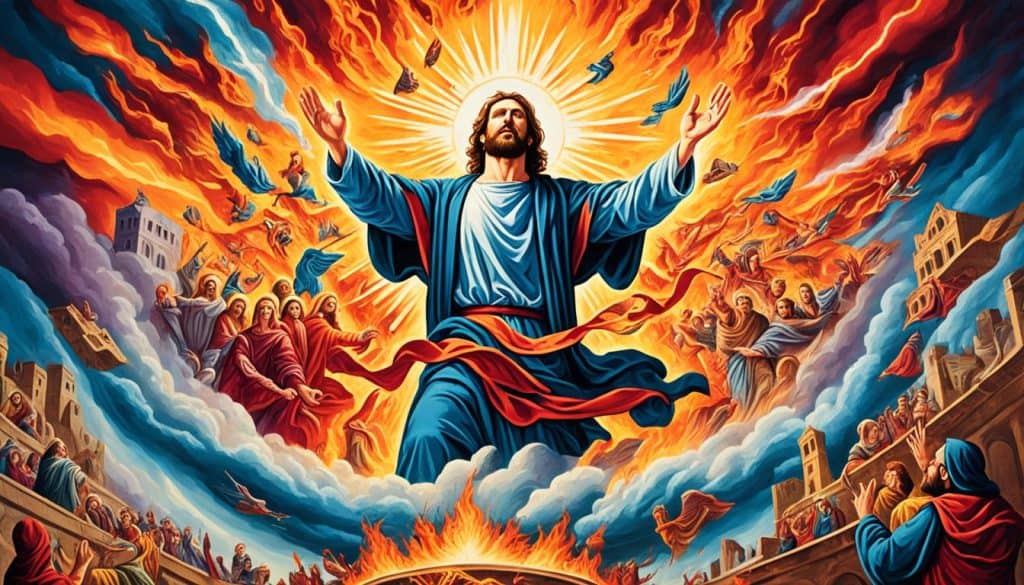
Key Takeaways:
- Daniel’s vision speaks of judgment and the kingdom given to the “Son of Man.”
- Jesus identifies himself as the “Son of Man” in Matthew 26:6, fulfilling Daniel’s prophecy.
- This vision aligns with the concept of Zion’s Justice, highlighting the establishment of a righteous kingdom.
- Jesus brings about the fulfillment of this vision through his life, death, and resurrection.
- As followers of Jesus, we are called to live lives that reflect the principles of God’s kingdom.
Haggai’s Prophecy and the Desire of All Nations Pointing to Jesus
The book of Haggai contains a prophecy concerning the temple in Jerusalem. This prophecy is deeply connected with Jesus and represents the fulfillment of justice in Zion.
Haggai 2:7 states, “I will shake all nations, and the desire of all nations shall come: and I will fill this house with glory, saith the Lord of hosts.” This text suggests a time when people worldwide will feel a pull towards Jerusalem. They will contribute to the glory of God’s house.
“I will shake all nations, and the desire of all nations shall come…” – Haggai 2:7
This prophecy highlights Jesus as the one all nations yearn for. Luke 2:32 supports this by describing Jesus as, “A light to lighten the Gentiles, and the glory of thy people Israel.” Jesus, the Messiah, brings hope to both Israel and the entire world, fulfilling Haggai’s prophecy.
Jesus embodies the desires of all nations by fostering justice, righteousness, and unity. He connects diverse nations and cultures, drawing everyone back to God.
| Prophecy | Fulfillment |
|---|---|
| Haggai 2:7 | Jesus as the desire of all nations |
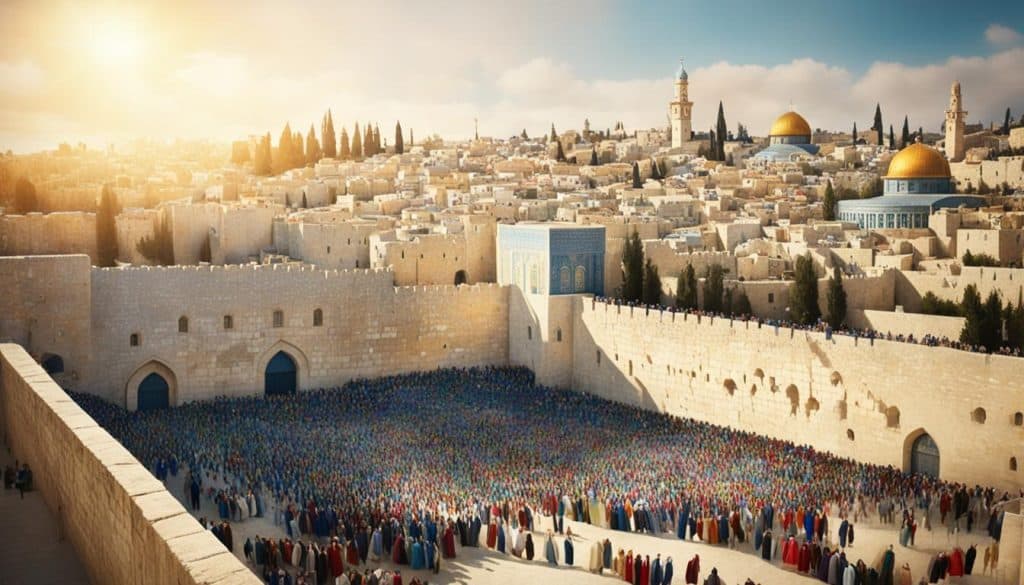
Jesus, as the desire of all nations, makes Zion’s Justice a reality. His life demonstrates love, kindness, and fairness. These values are key to God’s Kingdom.
We, as Christ’s followers, must live out His vision of justice and goodness. Through Jesus’ love, we play a part in achieving Zion’s Justice. This creates a just and peaceful world.
Malachi’s Prophecy and Jesus as the Messenger of the Covenant
Malachi 3:1 talks about a messenger who will make the way clear for the Lord. Jesus is seen as this Messenger of the Covenant. He came to complete God’s redemption plan and start Zion’s Justice.
Jesus, as the Messenger, shared messages of being right, just, and restoring. Mark 1:2-3 cites Malachi’s words, saying Jesus is the way-maker. Like Malachi said, Jesus helped people find God’s grace and forgiveness.
Jesus shared teachings, performed miracles, and sacrificed himself on the cross. He connected God and people, offering salvation and starting Zion’s Justice.
“Behold, I send my messenger before thy face, which shall prepare thy way before thee.”
– Malachi 3:1 (KJV)
Jesus’s work didn’t just match Malachi’s prophecy. It also showed what Zion’s Justice is about. His lessons highlighted love, kindness, and being right. He shook up the norms, pointed out wrong religious acts, and wanted people to change inside.
In his life, Jesus showed how to truly act justly. He healed the hurt, stood up for those left out, and was kind to those who needed it. His greatest act, dying on the cross, laid the foundation of Zion’s Justice. It gave redemption and hope to all believers.
So, Malachi’s prediction about the messenger who makes the Lord’s way comes true in Jesus. His life and death showed Zion’s Justice, making real God’s rescue plan. Through Jesus, we see the fairness, healing, and justice Malachi and Zion’s Justice talk about.
| Malachi’s Prophecy | Jesus as the Messenger of the Covenant |
|---|---|
| Fulfills the role of a messenger who prepares the way before the Lord | Recognized and affirmed by Mark as the one who prepares the way |
| Foretells the coming of the Lord and the establishment of justice | Embodies the essence of justice through his teachings and actions |
| Promotes righteousness and calls for transformation | Challenges societal norms and hypocrisy, advocating for righteousness |
| Offers the hope of redemption and restoration | Provides salvation and paves the way for the establishment of Zion’s Justice |
Zephaniah’s Vision of a Restored and Joyful Zion
In the book of Zephaniah, we find a message of hope. The prophet shares a vision of Zion, filled with joy and renewal. It shows how deeply the Lord cares for His people, wanting to bring them close again.
The idea of a joyful Zion touches believers deeply. It reminds them of God’s loyalty. It shows His plan to redeem and revive His chosen ones. The words in Zephaniah 3:17 sum this up:
“The LORD thy God in the midst of thee is mighty; he will save, he will rejoice over thee with joy; he will rest in his love, he will joy over thee with singing.”
These verses highlight God’s constant love and His joy in bringing people happiness. Zion’s restoration is about uniting believers. It’s about coming together in trust in the Lord.
Jesus also spoke of this joyful gathering. In Matthew 8:11, He talks about people joining from everywhere:
“And I say unto you, That many shall come from the east and west, and shall sit down with Abraham, and Isaac, and Jacob, in the kingdom of heaven.”
This gathering is a strong symbol. It stands for unity, love, and hope. It shows God’s promises coming true and His kingdom being built on earth.
The Gathering of Believers
Zephaniah’s vision and Jesus’s words tell us about faith’s power. God’s love is for everyone, no matter their past or where they’re from. It includes all kinds of people.
In this gathering, believers find comfort, happiness, and togetherness. It’s a place for peace, healing, and feeling God’s endless love. This image of Zion reminds us of the truth in God’s words and the boundlessness of His love.
Nahum’s Vision of Peace in Jerusalem and Jesus’ Mission
The book of Nahum shows us a peaceful vision for Jerusalem, a city that knew violence and chaos. It talks about Assyria’s fall and how peace would return to God’s people. This peace means not just safety but also justice, righteousness, and harmony.
Nahum 1:15 tells us, “Behold, upon the mountains the feet of him that bringeth good tidings, that publisheth peace!” This message is about the joy of peace coming to Jerusalem. It also hints at Jesus’ work, who brought the good news of salvation and unity to everyone.
“The Spirit of the Lord is upon me, because he hath anointed me to preach the gospel to the poor; he hath sent me to heal the brokenhearted, to preach deliverance to the captives, and recovering of sight to the blind, to set at liberty them that are bruised, to preach the acceptable year of the Lord.” – Luke 4:18-19
Jesus’ work echoes Nahum’s vision as he spreads peace, hope, and revival. He heals the heartbroken, frees captives, and brings light to the dark. Jesus fulfills Nahum’s prophecy, sharing the peace of Jerusalem with his actions, miracles, and his ultimate sacrifice.
Reflecting on Nahum and Jesus, we see the deep impact of God’s love and mercy. This peace message goes beyond now and touches our hearts, offering forgiveness, unity, and eternal life hope.
The Fulfillment of Zion’s Justice
Nahum’s peaceful vision for Jerusalem shows how true God is to His word, leading to Zion’s Justice. Zion’s Justice means living out God’s fairness, equity, and harmony in His city.
Jesus lived this justice. He taught us to love others, help the oppressed, and live as God’s kingdom citizens. In Luke 4:18-19, Jesus stated his mission: to bring good news, heal, free, and announce God’s favor. His mission is what Zion’s Justice is all about – peace, healing, freedom, and making all things new.
As Jesus’ followers, we’re invited to help make Zion’s Justice real. Doing acts of kindness, standing up for the weak, and seeking righteousness, we spread peace and healing. We embody the powerful, hopeful message shared by Nahum and completed by Jesus.
How Does the Torah Influence the Prophetic Calls for Righteousness in Jerusalem?
The influence of the Torah in Jerusalem is evident in the prophetic calls for righteousness. The teachings and principles found in the Torah have shaped the moral and ethical standards within the city, serving as a guiding force for the people of Zion and Torah in Jerusalem to prioritize righteousness in their actions.
Obadiah’s Prophecy of Deliverance and Holiness on Mount Zion
Obadiah’s prophecy, found in verse 1:17 of his book, talks about being saved and holy on Mount Zion. It links directly to how Jesus acts as our Savior. Through his actions, teachings, and sacrifice, Jesus fulfills what Obadiah predicted.
Mount Zion stands as a sign of God’s power and presence. It’s seen as a safe haven and a place for healing. Obadiah tells us that on this holy mountain, we find freedom and purity. This happens because of what Jesus did for us on the cross. He frees us from sin’s hold and helps us live holy lives.
Jesus brings salvation to everyone who trusts in him. In the book of Luke, his teachings highlight righteousness and holiness. If we follow in Jesus’ footsteps and accept his salvation, we step into the freedom and purity foretold by Obadiah.
To wrap up, Obadiah’s words shine a light on how Jesus changes us. With his help, we can reach Zion’s goal of justice. By embracing Jesus’ salvation and aiming for holiness, we fulfill Obadiah’s vision. We see this transformation in ourselves and among all who believe.

